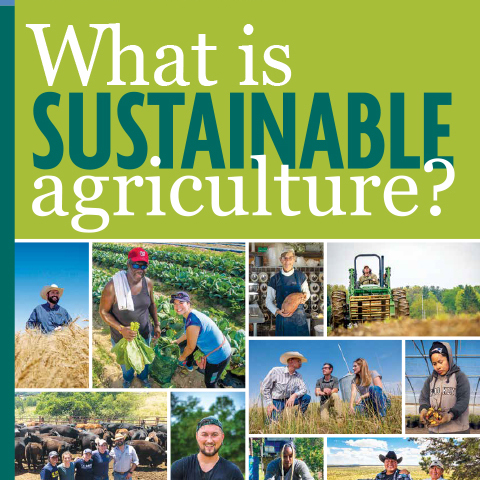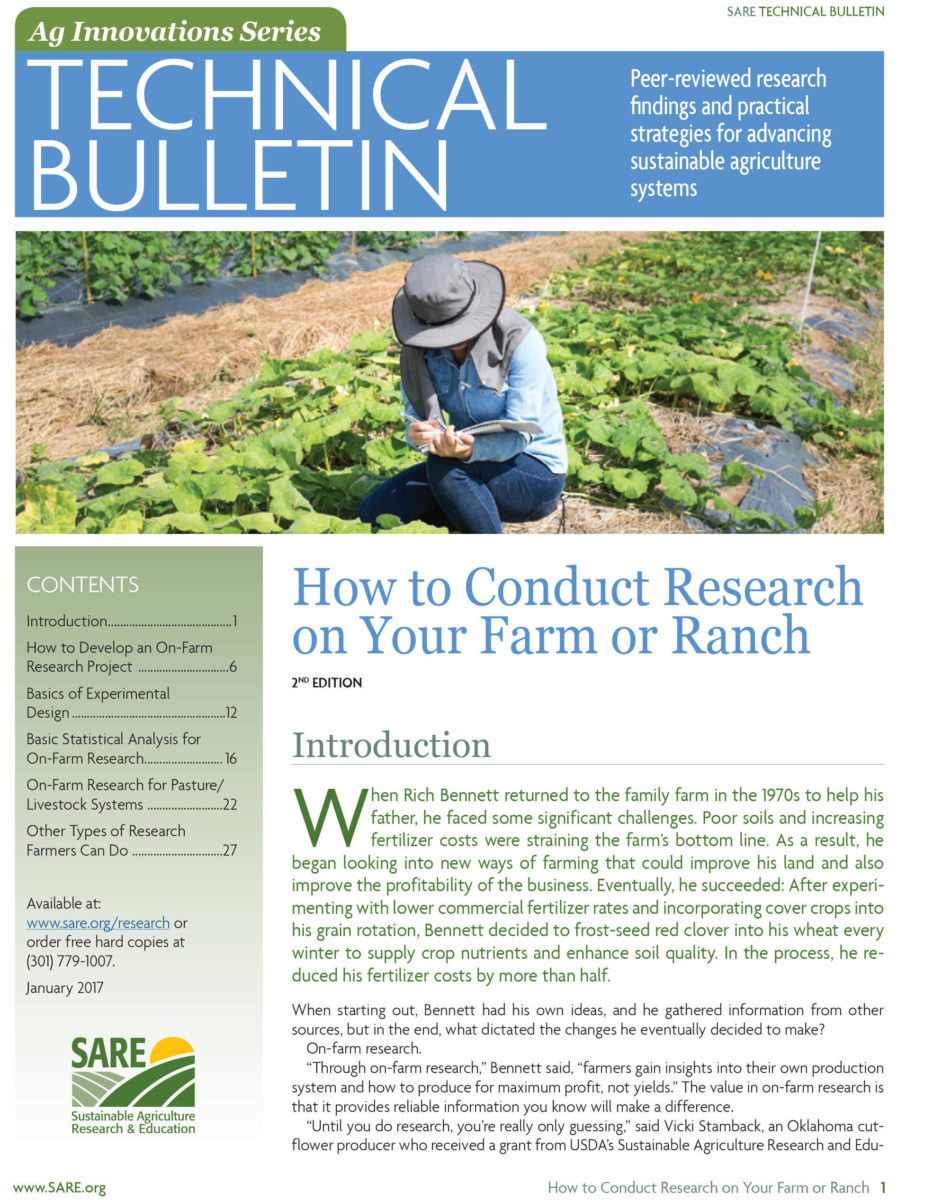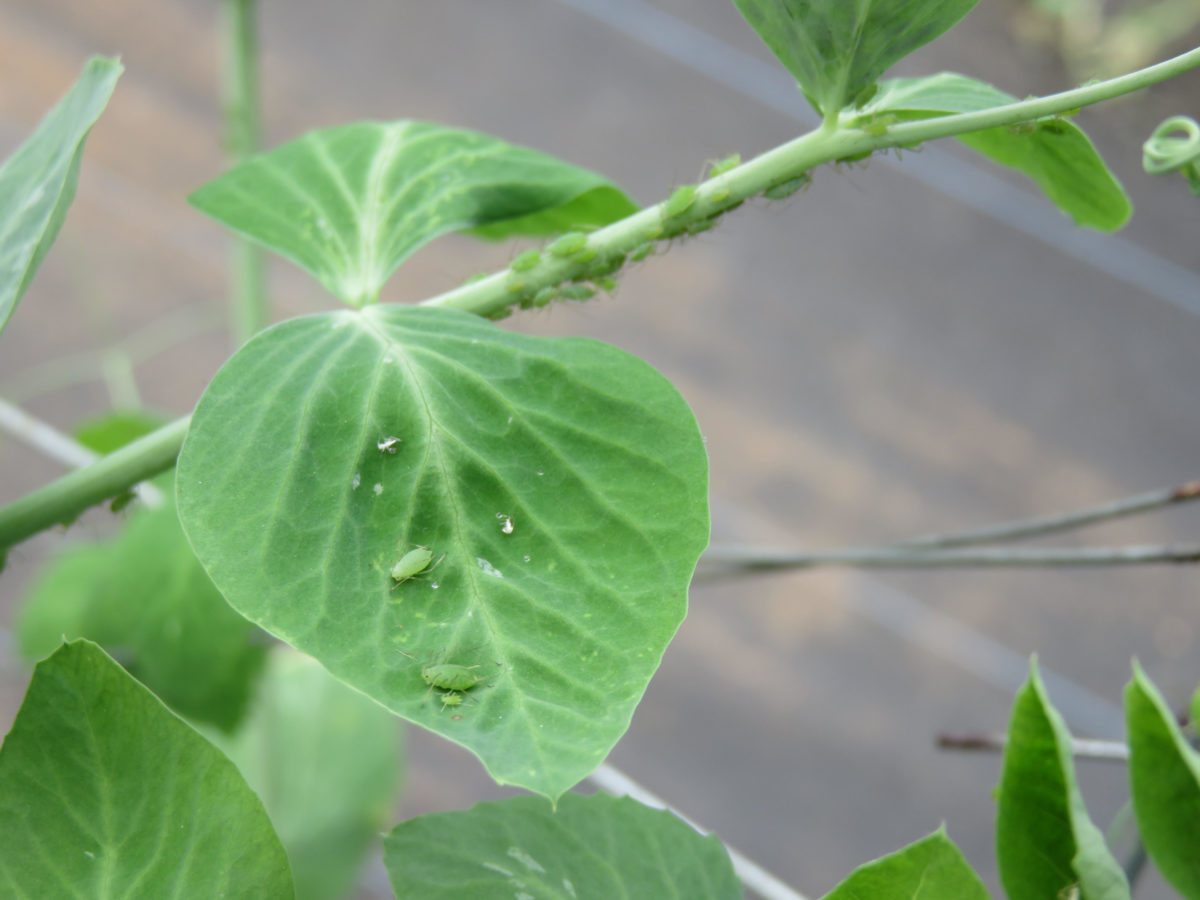-
On-Farm Research Grants
On-Farm Research Grants provide research opportunities for agriculture professionals working directly with farmers and ranchers on sustainable agriculture efforts.
What is Sustainable Agriculture?
Southern SARE has long supported farmers in their efforts to conduct new and innovative sustainable agriculture production practices. In 2002, On-Farm Research Grants were authorized to provide opportunities for those ag professionals working directly with farmers and ranchers on sustainable ag efforts.
Emphasizing relationship building between researcher and farmer, On-Farm Research Grants have no pre-proposal requirements, nor are applicants asked to demonstrate specific outcomes in an intensive way.
Proposed projects must focus on Southern SARE’s program objectives in developing sustainable agriculture systems or moving existing farming systems toward sustainability, as defined by Congress in the 1990 Farm Bill.
A simple way to think about sustainable agriculture is that it involves producing enough food and fiber to satisfy today’s needs without compromising the ability of future generations to do the same. Sustainability as defined by the SARE program embraces three common goals (or pillars of sustainability):
- Profit over the long term;
- Stewardship of our nation’s land, air and water;
- Quality of life for farmers, ranchers, farm employees and our communities.
Eligibility Requirements
On-Farm Research Grant proposals must meet the following basic requirements in order to be considered for funding:
- The proposed project focuses on sustainable agriculture practices and techniques to address a particular on-farm issue.
- Applicants must work directly with farmers/ranchers in their profession.
- Applicants must be located in the Southern region.
- Applicants must identify at least one farmer/rancher cooperator in the proposed project, and the work must be conducted on farm (either on the cooperator’s farm, or on a research farm with the cooperator’s involvement).
- The farmer/rancher cooperator’s primary occupation must be farming or ranching or they are a part-time producer. They run their own farm alone or with family or partners and have at $1,000 of documented annual income from their operation, as defined by USDA.
- Applicants may only submit one On-Farm Research Grant proposal per year.
- The proposed project satisfies the requirements of allowable expenses.
- An outreach component is identified in the proposal.
- Previous grant recipients are eligible to apply.
Who Can Apply?
Agricultural professionals who currently and regularly work with farmers and ranchers are eligible to apply for On-Farm Research Grants. These can be extension specialists; university researchers; government agencies, such as NRCS; NGOs; community organizations; or other groups or individuals, such as ag consultants.
On-Farm Research Grants are not open to farmers. Producer Grants are available to farmers who are interested in sustainable agriculture research.
Funding Amount
On-Farm Research Grant Calls for Proposals open September and grants are awarded in February the following calendar year. On-Farm Research Grant project maximums are $30,000 for two-year projects. It is difficult to extrapolate useable, replicable, practicable data from one-year research. USDA-NIFA will allow recovery of indirect costs. Indirect cost rates are limited to 10 percent of total direct costs.
On-Farm Research Grant funds are paid by reimbursement of allowable project expenses. Before applying, make sure you have the legal structure and financial capacity to receive and execute a Southern SARE grant. Advance payments are not possible.
Allowable Expenses
On-Farm Research Grant funds may be used for the following purposes:
- Costs of sampling and sample analysis. This can include in-field data collection or lab data analysis.
- Renting equipment needed for the project. The rental must not extend beyond the project’s timetable.
- Temporary irrigation and electric fences.
- Materials and supplies needed for the project. The materials and supplies must remain within the scope of the project and be a reasonable request relative to the research being conducted. An example would be the amount of seed needed relative to the size of the research plots.
- Travel needed for the project, which can include lodging, mileage and meals. The travel must relate to the project’s goals/activities.
- Salary of the PI conducting the project. The amount requested must remain within the scope of the project and be a reasonable salary request.
- Hiring labor needed to effectively conduct and complete the project within the proposed timetable. This can include hiring farmer/rancher labor beyond normal farming duties. Hired labor must remain within the scope of the project and be a reasonable salary request.
- Expenses related to the project’s outreach plan. This can include holding a field day, workshop, farm tour or demonstration program; the printing of educational materials, such as fact sheets, manuals or curriculum; or the development of other resources such as apps, webinars or videos. The educational materials developed for the outreach plan must remain within the scope of the work and be a reasonable request. An example would be the amount requested for the printing of educational materials relative to the size of the audience the resource is intended to reach during the life of the project.
- Refreshments at educational events, such as workshops or field days. You must demonstrate that providing refreshments is necessary to effectively execute your outreach plan and provide educational continuation of the outreach efforts (Encouraging participation, fellowship or gathering as a justification does not meet the guidelines).
Non-Allowable Expenses
On-Farm Research Grant funds cannot be used for the following purposes:
- Starting a farm, NGO, business or other community organization, or expanding an existing farm, NGO, business or other community organization. Providing any kind financial support relative to the operation of the farm, NGO, business of community organization.
- Providing support of any kind for capital expenses or permanent farm improvements, including purchasing equipment; purchasing permanent greenhouses, high tunnels or other buildings; purchasing permanent irrigation; purchasing permanent fencing; planting an orchard; purchasing bee hives; or purchasing crops or crop seed for use beyond the research plots and timetable of the project. Generally, any item that has permanent use beyond the life of the grant project is not allowed.
- Breakfasts, lunches or other full meals for the project’s outreach plan, or educational/resource event or program.
- Testing of commercial products. Products must be explored in broad generalizations.
- Any costs incurred for producing grant-required project annual and final reports.
- Participant incentives (payment must be related to work performed on the project).
- International travel.
- Tuition.
Grant Writing Tips
Southern SARE On-Farm Research Grants are competitive. Each year we receive more grant proposals than we have monies to award funding. Here are some suggestions that might aid in strengthening your proposal:
- Follow the instructions in the Call for Proposal. Failure to follow directions or omit any required information will result in your proposal being rejected.
- Make sure your proposal falls in one of the following focus areas: Beneficial insects, alternative crops/animals, organic agriculture, sustainable marketing projects, sustainable grazing systems, soil health or water quality, appropriate technology, agroforestry, or increasing sustainability of existing farming practices.
- Only one On-Farm Research Grant is allowed by the farmer applicant per grant cycle. If you have more than one idea, we recommend you select your best proposal for submission, and save your other ideas for future submissions.
- Thoroughly research your project before applying. You may have a great idea for a project, but the research related to the topic may already be well established. We look for projects that are new, innovative, generate results that are useful beyond one year and produce information that many farmers can use.
- Successful projects include clear goals and objectives. Due to the small size of the On-Farm Research Grants, we recommend developing no more than three (3) objectives in order to complete your project.
- We encourage collaboration and partnerships on grant projects. Cooperators help complement your skills. When you enlist the cooperation of people who have expertise in areas that you don’t, they’ll strengthen your project. Make sure to include cooperators from universities, Cooperative Extension, NGOs, community organizations, or other farmers to add value to your project.
- Make sure you include an outreach plan. Outreach plans can include field days, educational resources, how-to videos, publications, workshops, or presentations at workshops or other events to share research results with farmers.
- Don’t wait until the last minute to begin your proposal and to submit it to the SARE Grants Management online system. The deadline for proposal submissions is firm. Anticipate technological glitches, budget issues, user error or other issues that might cause delays.
- Be clear on the “what”, “why”, and “who cares” of your research project and how it pertains to sustainable agriculture. This is generally outlined in the “Statement of Problem” portion of your proposal. This is your “hook” for reviewers. Remember, they get to know you through your proposal. Tell your story.
- Seek assistance from other individuals or organizations in writing and reviewing your grant.
How Your Proposal Will Be Reviewed
On-Farm Research Grants are reviewed based on weighted scoring criteria. Upon closure of the grant deadline, proposals receive a technical review by outside technical reviewers across the Southern region with expertise in a wide range of sustainable agriculture research areas. Technical reviewers are assigned to proposals based on their expertise area.
Technical reviewers score and comment on proposals based on the following review criteria:
- Reviewing the Statement of the Problem to ensure that the applicant clearly describes the problem and why the problem needs to be addressed. (15 points)
- Reviewing the Statement of the Proposed Solution and Relevance to Sustainable Agriculture to demonstrate an improvement over the current problem and how the project and its expected results contribute to sustainable agriculture. Is the solution a new and creative innovation? Does the solution contribute to the growth of sustainable agriculture by building on and/or adding to existing knowledge? Is it a band-aid to conventional agriculture or does it move the needle in more sustainable farming practices? (15 points)
- Reviewing the Approaches and Methods to determine if the project experiment is clear, well designed and thought out so that useful and applicable results can be obtained. Approaches and Methods align with the budget request. (25 points)
- Reviewing the timetable to determine if the project can be effectively completed in the time provided based on the research proposed. (10 points)
- Reviewing the literature cited to demonstrate how well the applicant prepared their proposal based on published literature of the research topic. (5 points)
- Determining the effectiveness of the outreach plan. Is the outreach plan well thought out and a benefit to its intended audience? Are the methods for implementing the outreach plan the most effective way of reaching farmers and ranchers? (20 points)
- Evaluating the project’s budget to determine if the requested amount is reasonable and realistic, and is clear on what the funds will be spent on. Are the requested funds allowable? Are budget items itemized with clear justifications on how they will be used in the project? (10 points)
Once the technical reviewers complete their reviews, the Producer Grant Committee of Southern SARE’s Administrative Council (Southern SARE’s governing body) reads the high scoring proposals and meets virtually to discuss fundable proposals. The Producer Grant Committee convenes at the February Administrative Council (AC) meeting to finalize selections. Those are then recommended to the full Administrative Council and voted on for funding. By late February or early March you will be contacted regarding the status of your proposal, and a summary of the review comments for your proposal will be provided to you.
Expectations for Funded Proposals
If the Southern SARE Administrative Council selects your project for funding, you will expect the following:
Notification: Southern SARE selects On-Farm Research Grant proposals during its winter Administrative Council meeting February of each year. Applicants will be notified via email soon after regarding the status of their project. All projects officially start April 1.
Budget Reviews and Contracting: Proposals selected for funding will undergo a budget review by Southern SARE. Any revisions or changes will be made prior to the proposal sent to University of Georgia (Southern SARE’s host institution) for contracting. Applicants will receive a subaward agreement by University of Georgia via email for signature. Once signed, the project is officially executed.
Invoicing: All project expenses are paid on a reimbursement basis. Applicants will receive an invoice template and be required to submit receipts and invoices during the course of their grant project to be reimbursed for their expenses.
Required Reporting: On-Farm Research Grant recipients are required to submit an annual report each year their project is active, detailing the progress of their research. In the year the project ends, recipients are required to submit a final report, documenting their findings, outreach, and project impacts. Reports are submitted online to the SARE Grant Management System. Southern SARE will hold the final invoice submitted for reimbursement until the final report is submitted and approved. Read more about Southern SARE’s Reporting Requirements.
Grant Management Support: Southern SARE staff is available throughout the life of the project to assist recipients on questions or issues related to their grant project. Management guidelines are available for PI changes, budget modifications, and no-cost extensions. Read more about Southern SARE’s acounting and management guidelines.
Acknowledging Funding: As Southern SARE grantees work on their outreach plans and develop project products related to their grant, they are required by USDA-NIFA to acknowledge SARE funding in the materials that are developed. Read more about Southern SARE’s guidelines for acknowledging funding.


